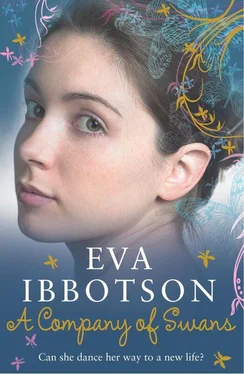The ladies exclaimed at the christening pictures of Paul Alexander in the arms of his French godmother, of whom Henry had taken more photographs than were strictly necessary. There was a photo of Madame Simonova, upstaging a French duchess who was declaring open the Simonova École de Dance; a recent one of the eight-year-old Natasha as a butterly at Madame Lavarre’s end-of-term dancing display…
And one at which Cynthia stopped and said, ‘Goodness! What on earth is that?’
‘A goat,’ said Henry. ‘A very special one. It has won innumerable prizes.’
But the picture was not only of a goat. Hanging on to the animal was a man in Lederhosen with embroidered braces and a Loden hat. Also in the picture, but a little out of focus, was a peasant lady in a kerchief holding what appeared to be a basket full of enormous runner beans.
‘Strange!’ said Mrs Belper, peering at the photograph. ‘The face looks familiar.’ And then: ‘Good gracious — it is him! It’s the young man Louisa wanted for Harriet!’
Henry grinned at the picture which he himself had taken last summer and labelled Dr and Mrs Finch-Dutton at Cremmora , for the story of Edward and Olga was one of which the family never tired. The first months had been hard for poor Edward, concealing his young bride in lodgings at the edge of the town and trying to hide his injuries as he crept in and out of college. Nor had the war years been easy, for with Edward away in the Pay Corps Olga had gone to live with the Mater in Goring-on-Thames. Whether or not the experience had shortened the Mater’s life was hard to say; at all events she had succumbed to a heart attack just after Edward’s demobilisation, leaving him a considerable sum of money. Now, in the wooden house which Dubrov had thankfully sold them, the Finch-Duttons lived in harmony rearing prize goats, prize vegetables and children — and if anyone bit Edward these days, it was almost certainly a goat.
The tour was over. The ladies thanked Henry — and with half an hour to go until the sit-down tea in the dining-room, they followed their president out into the grounds. Exclaiming, praising, responding graciously to the salutations of the many gardeners, they walked through the topiary, down the Long Walk, passed the place in the sunken garden where, all those years ago, they had had their picnic.
Mrs Belper was well in the lead when, coming round a corner, she stopped suddenly and stiffened. A sighting! Undoubtedly a sighting!
Rom Brandon himself was coming out of the rhododendron copse which edged the lawn and with him was his wife. Unaware of Mrs Belper’s presence, they walked together across the smooth grass — and even as she wondered whether or not to hail them they reached the pool of shade made by the crown of an ancient copper beech, turned towards each other — and kissed.
It was a quite extraordinary kiss. Even indoors at night, where such things sometimes happened, it would have been disconcerting — but here, out in the open air in the middle of a sunny afternoon, it was unutterably shocking. This man with his silvered hair and his honorary post as Financial Advisor to the Cabinet had gathered his wife to him as if in acute hunger, then and there, for her presence. And Harriet… What was one to say of a woman close to her thirtieth year, and obviously pregnant, who stood on tiptoe in order to put up her arms and pull down her husband’s head?
Mrs Belper stared. For the briefest of moments she remembered the opening bars of a Mozart sonata which her mother had liked to play, and that she had once thought there were angels. Remembered too Mr Belper, who had brought her white violets when they were engaged, cupping them in an unexpected manner in his hands for her to smell, but was now dead.
Then she pulled herself together. The spectacle was a disgusting one, the sighting useless… and turning away, she retraced her steps and shooed the oncoming ladies firmly back to the house for tea.












